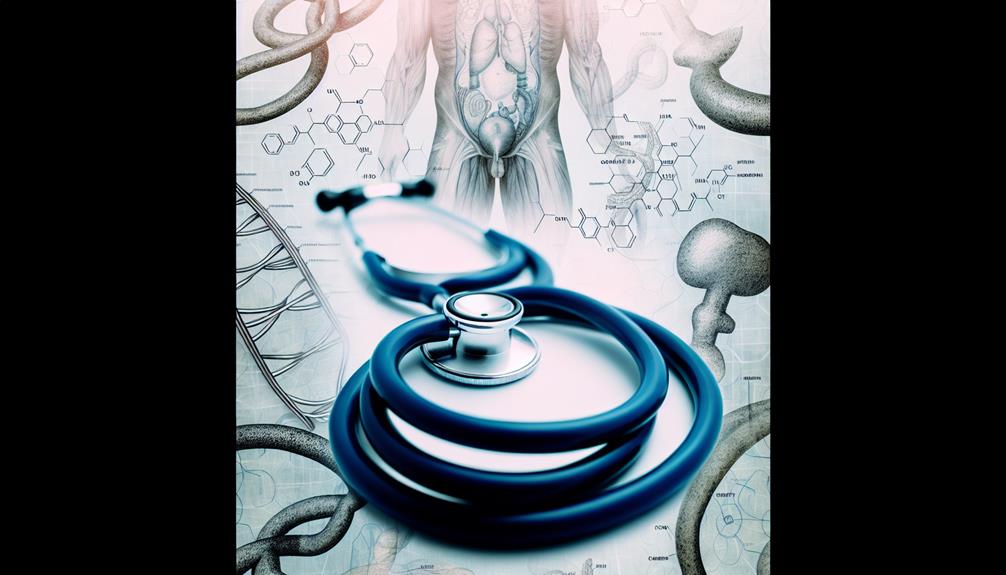In exploring factors contributing to male hormonal imbalance, I find that several elements play a vital role. Elevated stress can lead to increased cortisol levels, disrupting hormonal equilibrium. Poor dietary choices, particularly high processed food intake and nutrient deficiencies, further exacerbate these issues. A sedentary lifestyle and inadequate sleep quality hinder hormonal regulation. Environmental toxins, genetic predispositions, and aging also greatly impact hormone levels. Additionally, alcohol use and certain medications can disrupt hormonal balance. Understanding these interconnected factors is essential for managing hormonal health effectively. There's much more to uncover about maintaining hormonal stability in everyday life.
Stress and Cortisol Levels

When it comes to understanding male hormonal imbalances, stress and its impact on cortisol levels are essential factors that can't be overlooked. I've observed that elevated cortisol levels, often a response to chronic stress, can disrupt hormonal balance and lead to various health issues. Cortisol management becomes fundamental; if we fail to address stress triggers, we risk compromising our adrenal health and overall mental well-being.
Implementing mindfulness practices is one effective way I've found to mitigate stress. Techniques like meditation and deep-breathing exercises can greatly enhance emotional resilience, allowing us to better handle life's pressures. In addition, relaxation techniques such as progressive muscle relaxation or yoga can serve as powerful tools in stress reduction. By consciously engaging in these activities, I've experienced a marked improvement in my stress response.
Furthermore, understanding personal coping mechanisms is important. Identifying what triggers my stress allows me to develop targeted strategies for managing it. This proactive approach not only aids in cortisol regulation but also promotes a more balanced hormonal environment. It's important to remember that the body's stress response is not merely a reaction; it's a complex system that, if left unchecked, can lead to detrimental health outcomes.
Poor Dietary Choices
I've observed that poor dietary choices, particularly high consumption of processed foods, can greatly disrupt hormonal balance in men. Nutrient deficiencies stemming from these dietary habits can lead to inadequate hormone production, while excessive sugar intake has been shown to interfere with hormonal regulation. Understanding these connections is essential for addressing hormonal imbalances effectively.
Processed Food Consumption
In recent years, the rise in processed food consumption has considerably contributed to male hormonal imbalances. Fast food, often laden with high levels of fats, sugars, and salt, has become a staple in many diets. These foods not only lack essential nutrients but also contain a plethora of artificial additives that can disrupt endocrine function. For instance, studies have linked certain preservatives and flavor enhancers to alterations in testosterone levels, which is vital for male health.
I've noticed that the convenience of fast food often overshadows the long-term consequences of such dietary choices. The frequent intake of these processed products can lead to an accumulation of harmful substances in the body, further exacerbating hormonal discrepancies. It's essential to understand how these artificial additives may mimic or interfere with hormonal activities, potentially leading to issues like reduced libido or increased fatigue.
Nutrient Deficiency Impact
Nutrient deficiencies resulting from poor dietary choices can markedly disrupt hormonal balance in men. I've noticed that vitamin deficiencies, particularly in B vitamins and vitamin D, can hinder testosterone production and overall hormonal health. Additionally, mineral imbalances, such as low zinc or magnesium levels, further exacerbate this issue, as these minerals play significant roles in hormonal regulation.
Inadequate protein intake compromises the body's ability to build and repair tissues, affecting hormonal synthesis. Essential fatty acids, often lacking in a poor diet, are crucial for maintaining cell membrane integrity and facilitating hormonal synergy. Furthermore, without proper nutrient absorption, the body struggles to utilize dietary supplements effectively, leaving gaps in micronutrient ratios important for hormonal balance.
Gut health is another important factor; a compromised microbiome can impair nutrient absorption and create an inflammatory environment that disrupts hormonal function. The antioxidant role of various nutrients cannot be overlooked, as oxidative stress can lead to hormonal dysregulation. By focusing on a balanced, nutrient-rich diet, we can support our hormonal health, ensuring that each component works harmoniously for peak function.
Sugar and Hormones
Dietary choices, particularly the consumption of sugar, play a significant role in hormonal regulation. I've observed that poor dietary sugars can lead to detrimental effects on our hormonal responses. The relationship between sugar metabolism and insulin resistance is particularly alarming, as it disrupts glucose regulation and can trigger chronic inflammation.
Here are three key factors to reflect on:
- Fructose Impact: High fructose intake, often from sweeteners, can exacerbate insulin resistance, leading to increased fat accumulation and disrupted hormonal signaling.
- Sugar Cravings: The cycle of sugar cravings can lead to overconsumption, further exacerbating hormonal imbalances and complicating metabolic health.
- Sweetener Effects: Artificial sweeteners can alter gut microbiota, impacting insulin sensitivity and ultimately affecting our hormonal landscape.
In my analysis, it's evident that reducing dietary sugars is essential for maintaining ideal hormonal balance. By being mindful of our sugar intake and understanding its effects on insulin and glucose, we can take proactive steps towards better health and hormonal stability.
Sedentary Lifestyle

A sedentary lifestyle contributes considerably to male hormonal imbalances by limiting physical activity, which is essential for maintaining healthy hormone levels. I've observed that physical inactivity often leads to weight gain, further exacerbating hormonal disruptions and negatively affecting overall health. Additionally, the stress associated with a lack of movement can compound these issues, creating a cycle that's difficult to break.
Physical Activity Deficiency
How does a sedentary lifestyle contribute to hormonal imbalances in men? I've noticed that when activity levels drop, it can greatly disrupt hormonal health. A lack of physical activity hampers the body's natural production of testosterone, leading to various health issues. Here are three vital factors to take into account:
- Reduced Exercise Motivation: When I don't engage in regular fitness routines, my overall motivation for exercise declines, perpetuating a cycle of inactivity.
- Impaired Workout Consistency: Inconsistent physical training limits the effectiveness of strength building and aerobic exercises, essential for maintaining hormonal balance.
- Neglected Movement Habits: Without sports participation and flexibility training, I miss out on important activities that promote hormonal regulation and overall well-being.
Weight Gain Consequences
As physical activity decreases, the likelihood of weight gain increases, creating a notable impact on hormonal health. I've noticed that a sedentary lifestyle often leads to an unfavorable shift in body composition, which can exacerbate hormonal imbalances. When we gain weight, particularly in the form of visceral fat, our bodies tend to produce more estrogen, which can disrupt the delicate balance of hormones like testosterone.
It's vital to understand how body composition effects can reverberate through our overall health. For instance, increased fat mass can lead to insulin resistance, further complicating our hormonal landscape. Implementing effective weight management strategies becomes imperative here. Regular physical activity, coupled with a balanced diet, can help mitigate these adverse effects.
I've found that even small changes, such as incorporating short bouts of exercise into my daily routine, can markedly improve my hormonal balance. By conscientiously managing weight through lifestyle adjustments, we can combat the challenges posed by a sedentary lifestyle and promote healthier hormone levels. Ultimately, recognizing the consequences of weight gain on hormonal health is essential for making informed decisions about our wellbeing.
Stress Impact Factors
Stress is a significant factor influencing hormonal balance, particularly for those leading a sedentary lifestyle. I've observed how prolonged periods of inactivity can exacerbate stress levels, leading to hormonal imbalances that affect overall health. This is especially true when chronic anxiety is involved, as it can trigger an overproduction of cortisol, the stress hormone.
Here are three ways a sedentary lifestyle impacts stress and hormonal balance:
- Reduced Physical Activity: Lack of exercise can lower endorphin levels, which are vital for mood regulation. Without these natural mood lifters, stress can build up, causing hormonal fluctuations.
- Poor Sleep Quality: A sedentary lifestyle often correlates with irregular sleep patterns. Sleep deprivation heightens cortisol levels and further disrupts hormonal equilibrium.
- Mindfulness Techniques: Incorporating mindfulness techniques is essential. Engaging in practices such as meditation or deep breathing can mitigate stress and help restore hormonal balance.
Sleep Deprivation
Sleep deprivation can greatly disrupt hormonal balance in men, leading to a cascade of physiological effects. I've noticed that inadequate sleep quality directly correlates with fluctuations in hormones such as testosterone. This imbalance can stem from various factors, including irregular circadian rhythms and poor sleep hygiene. When I fail to prioritize consistent bedtime routines or neglect my sleep environment, I inadvertently contribute to sleep disorders.
Additionally, technology use before bed can further exacerbate these issues. The blue light emitted from screens interferes with melatonin levels, making it challenging to fall asleep. I've found that employing relaxation techniques, like mindfulness or deep breathing exercises, can help mitigate these effects, but it's fundamental to establish a conducive sleep environment as well.
Moreover, my napping habits can greatly impact my overall sleep quality. While a short nap can be revitalizing, lengthy or late-afternoon naps can disrupt nighttime sleep, perpetuating a cycle of sleep deprivation. Understanding these dynamics has made me more conscious of how I manage my sleep.
As I explore deeper into the relationship between sleep and hormonal balance, I've realized that prioritizing sleep is not merely a lifestyle choice; it's vital for maintaining hormonal equilibrium. By being mindful of my habits and making adjustments to my sleep practices, I can better support my overall health and hormonal stability.
Environmental Toxins

Environmental toxins play a noteworthy role in disrupting hormonal balance in men. My research indicates that various forms of chemical exposure can lead to an increase in endocrine disruptors, which can greatly affect testosterone levels. These disruptive agents are not just limited to industrial pollutants; they encompass a wide array of substances found in our everyday environment.
Here are three primary categories of environmental toxins that I believe contribute to male hormonal imbalance:
- Heavy Metals: Exposure to metals like lead and mercury can interfere with hormone production and regulation. These metals often accumulate in the body over time, leading to chronic health issues.
- Agricultural Chemicals: Pesticides and herbicides used in farming often contain compounds that mimic hormones, disrupting the endocrine system. This is particularly concerning given the prevalence of these chemicals in our food supply.
- Plastic Additives: Chemicals such as bisphenol A (BPA) found in plastics can leach into food and beverages, acting as endocrine disruptors. This kind of exposure can occur from various sources, including water contaminants and household chemicals.
It's essential to reflect on how air quality and occupational hazards also contribute to the toxic load we experience. In my view, understanding these environmental toxins is crucial for recognizing their potential impact on male hormonal health. Addressing these exposures can be an important step toward restoring hormonal balance and improving overall well-being.
Aging Process
As men age, I've observed a notable decline in testosterone levels, which can greatly affect overall health and well-being. Additionally, lifestyle choices, such as diet and exercise, play a critical role in either mitigating or exacerbating these hormonal changes. Understanding these factors is essential for maintaining hormonal balance throughout the aging process.
Testosterone Decline Over Time
Over the years, I've observed that testosterone levels in men typically decline by about 1% per year after the age of 30. This gradual decrease can lead to significant hormonal fluctuations, impacting various aspects of life. Understanding the reasons behind this decline is vital for addressing potential issues through interventions like testosterone therapy.
Several factors contribute to this gradual decline:
- Aging: Natural biological processes lead to decreased testosterone production, affecting mood, energy levels, and libido.
- Health Conditions: Chronic illnesses, obesity, and metabolic syndrome can exacerbate the decline in testosterone levels.
- Lifestyle Choices: Stress, lack of sleep, and poor diet can further lead to hormonal imbalances.
As men progress through the aging process, recognizing these factors can empower them to seek appropriate solutions. Testosterone therapy can mitigate some effects of this decline, but it's important to approach this treatment with an understanding of individual health status and the potential side effects. By being proactive and informed, we can navigate the challenges posed by declining testosterone levels effectively.
Impact of Lifestyle Choices
Recognizing the considerable role of lifestyle choices is essential in understanding how they impact the aging process and hormonal balance in men. As I explore this topic, I can't help but consider how my own exercise habits and mental health have shaped my experiences. Research indicates that physical activity not only boosts testosterone levels but also enhances overall well-being. Conversely, sedentary lifestyles contribute to hormonal imbalances.
Here's a concise overview of how various lifestyle choices impact hormonal health:
| Lifestyle Factor | Impact on Hormones | Related Health Aspect |
|---|---|---|
| Regular Exercise | Increases testosterone | Improves mental health |
| Poor Diet | Decreases hormone levels | Contributes to obesity |
| High Stress Levels | Disrupts hormonal balance | Impairs mental well-being |
| Sleep Quality | Regulates hormone production | Affects mood and cognition |
| Substance Abuse | Lowers testosterone | Compromises mental health |
As I reflect on these factors, it's clear that adopting healthier exercise habits and prioritizing mental health can greatly mitigate hormonal imbalances associated with aging.
Medical Conditions

Medical conditions can greatly disrupt hormonal balance in men, leading to a range of physical and psychological issues. I've observed how certain medical conditions not only affect individual health but also contribute to a cascade of hormonal imbalances. Understanding these conditions is vital for effective management.
- Metabolic Syndrome: This cluster of conditions, including obesity effects and diabetes management, can lead to insulin resistance, impacting testosterone levels and overall hormonal health.
- Thyroid Dysfunction: An underactive or overactive thyroid can markedly alter hormone production. Low thyroid function can result in fatigue and weight gain, while hyperthyroidism can lead to anxiety and fertility issues.
- Pituitary Disorders: The pituitary gland plays a pivotal role in regulating hormones. Disorders affecting this gland can result in adrenal fatigue and disrupt the balance of sex hormones, leading to decreased libido and other reproductive health issues.
Chronic illnesses, cardiovascular health problems, and liver health can also play a substantial role in hormonal imbalances. For instance, chronic illness often leads to fatigue and stress, which can further exacerbate adrenal fatigue. It's essential to recognize how interlinked these medical conditions are to effectively address the root causes of hormonal imbalances. By focusing on managing these conditions, I believe we can markedly improve overall hormonal health and quality of life for men.
Alcohol and Substance Use
How do alcohol and substance use impact hormonal balance in men? The relationship is complex and multifaceted. Binge drinking effects can drastically alter testosterone levels, leading to decreased libido and fertility issues. I've observed that the alcohol metabolism impact often results in elevated estrogen levels, further contributing to hormonal imbalance. Substance abuse consequences extend beyond immediate physical health, as chronic use can disrupt the hypothalamic-pituitary-gonadal axis, essential for hormone regulation.
When addressing these issues, it's crucial to reflect on addiction recovery strategies. These approaches can aid in restoring hormonal balance, as they often incorporate lifestyle modification techniques aimed at improving overall health. For instance, a reduction in alcohol intake and the avoidance of recreational drugs can greatly enhance well-being and hormonal stability.
Withdrawal symptoms management is another critical aspect of recovery that deserves attention. The physiological and psychological effects of withdrawal can exacerbate hormonal imbalances, making it essential to have a thorough plan in place. This could involve support groups, therapy, and, in some cases, hormonal therapy options may be explored to mitigate the impact on hormonal levels during the change.
Hormonal Medications

While addressing the effects of alcohol and substance use on hormonal balance, it's important to reflect on how hormonal medications can play a role in managing imbalances. Hormonal therapy serves as a significant treatment option for many men dealing with hormonal deficiencies or disruptions. However, the effectiveness of such therapies can be influenced by various factors, including medication interactions and adherence to prescription guidelines.
Understanding the potential side effects of hormonal medications is essential for ensuring patient safety and therapy effectiveness. These side effects can include weight gain, mood changes, and increased risk of cardiovascular issues. Consequently, it's essential to evaluate:
- Dosage Adjustments: Regular monitoring and adjustments may be necessary to optimize hormonal balance while minimizing adverse effects.
- Endocrine Disruptors: Awareness of environmental factors that might interfere with medication efficacy is significant.
- Patient Education: Educating patients about their treatment options and potential medication interactions can greatly enhance adherence and outcomes.
Ultimately, achieving hormonal balance requires a thorough approach. This includes regular evaluations and a collaborative relationship between healthcare providers and patients. By prioritizing patient education and understanding medication side effects, we can improve not only the quality of life for those affected but also the overall success of hormonal therapy. Remember, effective management of hormonal imbalances isn't just about the medications themselves; it's about how we approach the entire treatment plan.
Genetics and Family History
Genetics and family history play a pivotal role in understanding male hormonal imbalances. Through my research, I've observed that genetic predisposition can greatly influence an individual's hormonal health. Variations in genes associated with hormone regulation can lead to discrepancies in testosterone levels, affecting mood, energy, and overall well-being. If you consider your family's health history, you'll likely find patterns that indicate a shared susceptibility to hormonal issues.
Familial patterns often reveal that conditions such as low testosterone levels or other endocrine disorders can be hereditary. For instance, if multiple male relatives have experienced similar hormonal imbalances, it could suggest a genetic link. This connection becomes even more evident when examining conditions like Klinefelter syndrome or androgen insensitivity syndrome, which have a clear genetic basis and can affect hormonal levels in males.
Moreover, epigenetic factors—how genes express themselves in response to environmental influences—may also compound these hereditary risks. A family history of obesity or metabolic syndrome, for example, can interact with one's genetic predisposition and further exacerbate hormonal imbalances.
Frequently Asked Questions
How Can I Identify Signs of Hormonal Imbalance in Men?
Identifying signs of hormonal imbalance in men involves symptom awareness and careful observation. I've noticed that changes in energy levels, mood swings, and sleep disturbances can point to an imbalance. Additionally, lifestyle adjustments, like improving diet and exercise, often reveal underlying issues. Tracking these symptoms over time can be essential. If I observe persistent changes, consulting a healthcare professional could provide clarity and guide necessary interventions for balance.
What Role Does Exercise Play in Hormonal Health for Men?
When I started strength training regularly, I noticed a significant boost in my energy levels and mood. Exercise plays an essential role in hormonal health for men, particularly through strength training and cardiovascular fitness. Strength training can increase testosterone levels, while cardiovascular workouts enhance overall hormonal balance by reducing stress and improving blood flow. Together, these forms of exercise contribute to better hormonal health, leading to improved physical and mental well-being.
Are There Natural Supplements to Support Male Hormone Levels?
Absolutely, there are several natural supplements that can support male hormone levels. I've found that herbal remedies like ashwagandha and fenugreek can be quite effective. Additionally, dietary changes, such as increasing healthy fats and protein intake while reducing processed foods, play a vital role in hormone regulation. It's essential to approach this holistically, combining these supplements with a balanced lifestyle for best hormonal health. Always consult with a healthcare professional before starting anything new.
How Do Hormonal Imbalances Affect Mental Health in Men?
Have you ever felt like your mood swings are just a rollercoaster ride? Well, hormonal imbalances can greatly affect mental health in men. I've noticed that when my hormone levels are off, I experience severe mood fluctuations and increased stress. It's vital to manage stress effectively, as it exacerbates these imbalances. Understanding this connection can lead to better mental health strategies, helping us regain stability and clarity in our lives.
Can Hormonal Imbalances Impact Fertility in Men?
Yes, hormonal imbalances can greatly impact fertility in men. When testosterone levels drop, it often leads to decreased sperm quality, which can hinder conception efforts. I've read studies indicating that low testosterone is linked to lower sperm counts and motility. This relationship showcases the importance of maintaining balanced hormones for reproductive health. If you're experiencing symptoms of hormonal imbalance, consulting a healthcare provider is essential for addressing potential fertility issues.
